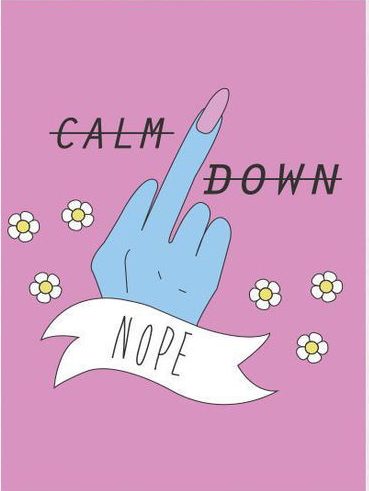I get so annoyed when people complain that America is “getting too sensitive”. What does that even mean? Is it wrong to respect humanity so much that we get upset if anyone commits mental and emotional violence on others with their words and actions? Is it wrong to be concerned that negative ideologies, beliefs, and stereotypes are being reinforced by the media or people who simply like to hear themselves talk?
Don’t get me wrong, I enjoy fun and “ratchet” music and TV or a (thoughtful) satire or a sarcastic joke as much as the next person but sometimes humor and entertainment value are used as excuses to continue to cast a blind eye on how marginalized groups are treated and viewed in this country. Sadly, the unwillingness to learn about others takes precedence over understanding others’ experiences in order to simply treat people better. And it doesn’t stop at entertainment and social media. There are many offensive things that take place in our everyday lives that have been so accepted that it is hard to convince people of their harmful nature. Things like work and school micro-aggressions, exclusionary practices, and cultural and ethnic erasure and homogenization are just a few ways we have ingrained ignorance into our existence.
To the people who believe we are getting too sensitive nowadays, I encourage you to consider this. I’m sure that when blatantly harmful, racist and sexist TV shows and movies were made back in the day, protests of them were met with, the same “Oh, you’re being too sensitive” accusations. Can you imagine if “Married with Children” or “Amos ‘n’ Andy” was on TV today? There would be a tremendous outcry and no one would say that the people who were offended by these shows were being overly sensitive.
On a larger scale, laws that prohibited Blacks and women from voting, laws that banned same-sex and interracial marriages, and laws that did not criminalize men for raping their wives were passed without a second thought. When those laws were enacted and then enforced, they were commonly accepted as justified and fair. So because of this, when people rightfully pushed back from them, they were met with scoffs that they were being ridiculous. In pre-Civil War America, if a slave said one day, “Hey, how about you treat me like a human being and not a piece of chattel,” that slave would have been beaten for having such an outlandish thought. Abolitionists were looked at as being overly concerned with the needs and rights of Black slaves and no one blinked an eye when listing off every reason that slavery was OK and necessary to the economy.
Today, we know that these laws and offensive media were unacceptable because they encouraged negative stereotypes and racism and were representative of a complete disregard of human rights. They made hate not only OK but legal. This was not just dangerous because people’s “feelings were hurt” it was dangerous because it allowed bigoted and misogynistic people to justify violence against others that they didn’t believe were equal to them. As the above examples show, we are not getting too sensitive, we are evolving. As times change, we get smarter and more enlightened — well, most of us anyway.
Then there’s the misconception of the idea of free speech. The First Amendment doesn’t state that someone who is free to speak is also completely free of repercussions for the things they say. Furthermore, there are very clearly laid out exceptions to this amendment. One of the biggest exceptions is words that threaten or incite violence are not protected by the First Amendment. There are many other nuances to the First Amendment. For example, it is only applicable to speech in public spaces and only states that the government can’t punish the speaker — whoever privately owns the establishment they are “freely” speaking in can do what they want with them, within the law, of course. A person can’t just go around saying whatever they want, wherever they want.
As for media, sure, it’s super hard not to indulge in problematic entertainment, but as with everything, there should be a balance. If we continue to educate ourselves and consume media that uplifts us and celebrates other’s cultures and lifestyles then when we do decide to give into our guilty pleasures, we will be digesting it from a place of awareness and a solid foundation of knowledge. If we learn about why certain things are offensive to people of other cultures and identities, we will better understand why we shouldn’t engage with these things and maybe we can make living in this messed up society a little bit easier for everyone.
The bottom line is that people should stop treating their jokes or their social media soap boxes as more important than another person’s livelihood or existence. Everyone can have an opinion but spewing hate speech or creating content that encourages hate is clearly going to be met with opposition, so don’t be shocked when it does and then point the finger at the person or people who you have offended. It is one thing to selfishly choose to be offensive but it is another thing to shame people for being offended by the things you say as if their right to live without society antagonizing them for being themselves is not a basic human right.



